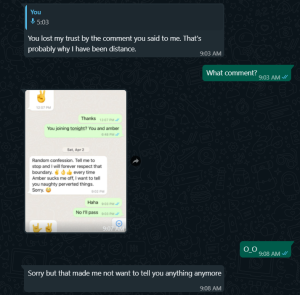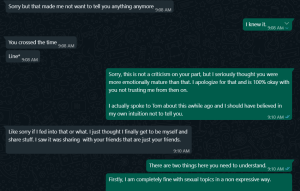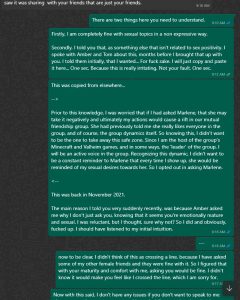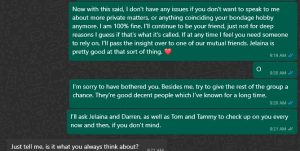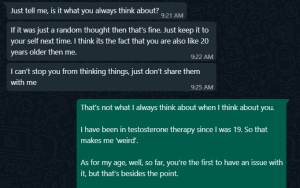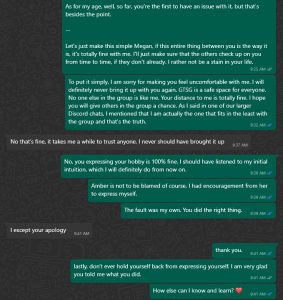Friendships are supposed to be a sanctuary of trust and mutual respect. Yet, my experience with Marlene taught me how easily those foundations can crumble when someone manipulates that trust.
Marlene joined our gaming group over a decade ago as a teenager, introduced by a mutual friend. Initially, she was a young and reserved person, but over time, she became more integrated, sharing parts of her life and personality. By 2022, she had presented herself as an open-minded, sexually liberated adult who appreciated being treated as an equal and not a child. Encouraged by her self-proclaimed confidence, I believed we had a safe space for candid conversations, including those about sex and relationships.
In February 2022, our chats occasionally veered into personal and even sexual topics, initiated often by Marlene herself. She openly discussed her interests, including her rope bondage art, and expressed gratitude for how comfortable our group made her feel. Encouraged by this dynamic, I made a casual, respectful proposition for a sexting friendship, which she declined with grace. I accepted her rejection without issue, thinking this was the end of the matter. Never did I bring that up again, or made any other sex-related propositions.
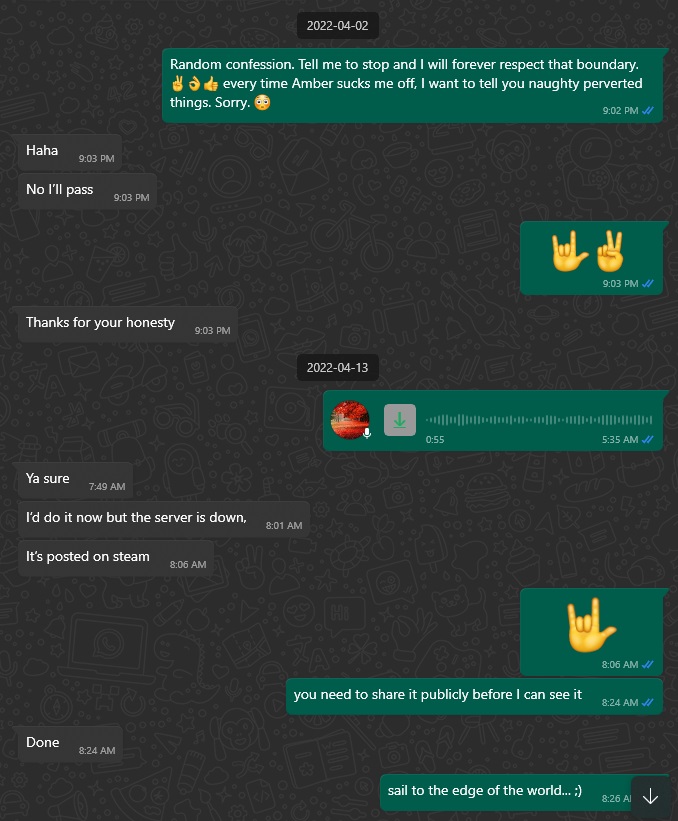
But weeks later, things took a turn. During a discussion about restarting our Valheim server, Marlene suddenly lashed out at the group, accusing us of excluding her and not being there for her – a baseless claim given our consistent efforts to include and support her. Her disproportionate response was baffling and hurtful. Multiple people reached out to me in private, expressing their disbelief. I did not respond to any of them, but just acknowledged what they shared with me. Alas, what followed was even worse.
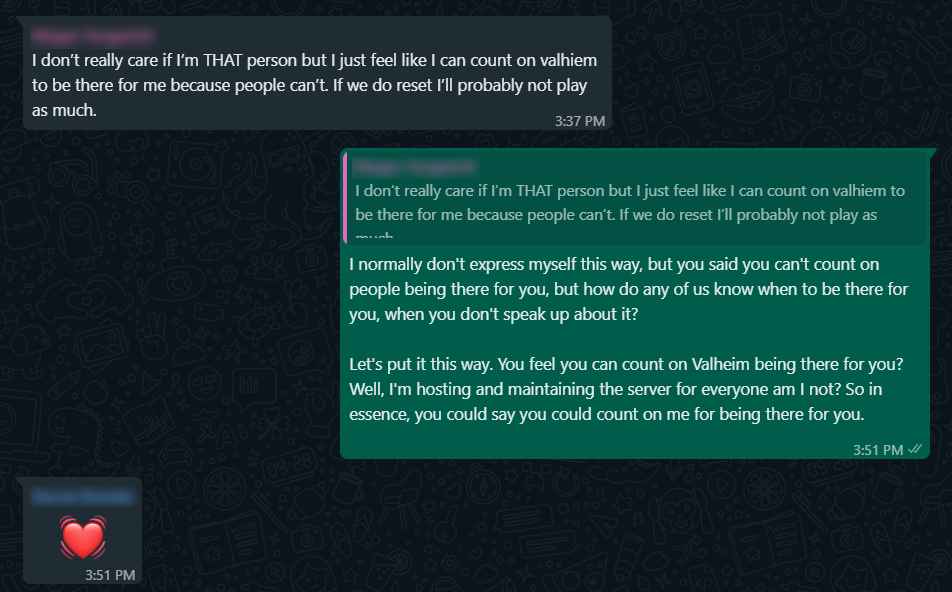
Two weeks after that, I reached out privately to address her outburst, but Marlene denied feeling upset and instead tried to rewrite the narrative, claiming her behaviour was entirely calm and rational. She was trying to gaslight me – a deliberate attempt to make me or us, question the perception of events. What’s more, I later discovered she had shared selective, out-of-context snippets of our private conversations with a mutual friend, painting me as predatory and casting my candidness in a sinister light.
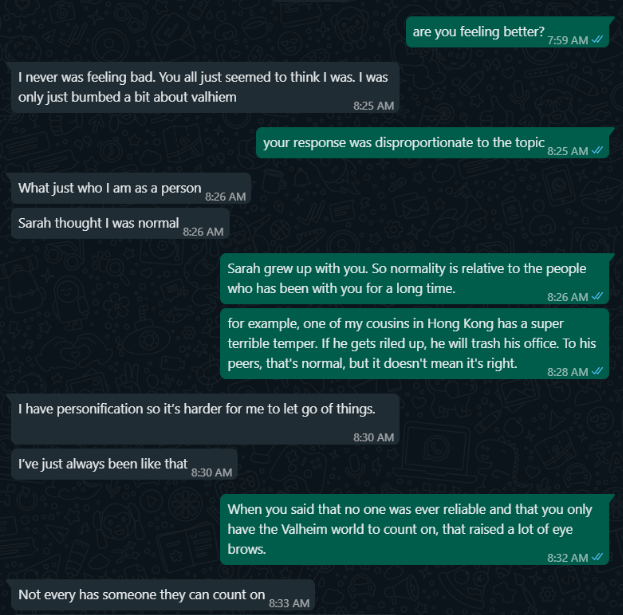
This betrayal cut deeply. I had trusted Marlene, treated her with the respect and honesty she claimed to value, and upheld her autonomy as an adult. Her actions revealed not maturity but manipulation and an unwillingness to take accountability. She wielded my trust and openness as weapons to deflect responsibility and distort the truth.
So what changed?
How did her trust in me erode so suddenly? I was left bewildered, deeply disappointed, and disheartened. Here was someone who had openly expressed her appreciation for being treated as an equal despite her youth – someone who prided herself on her lack of judgment and her open-mindedness. Yet her actions betrayed those very values she claimed to uphold.
It seemed she wanted the freedom to present herself as mature and unreserved when it suited her, while still demanding the careful handling of herself, who could not be challenged or questioned. In essence, she wanted to enjoy the privileges of adulthood without embracing the responsibilities that come with it – a desire to have her cake and eat it too.
Now, I want to emphasize on a few things that she had said to me, that really upset me.
She said, “Like sorry if I fed into that or what, I just thought I finally get to be myself and share stuff. I saw it was sharing with your friends that are just your friends.”
Firstly, this is a two-way street of trust and openness. I was sharing my thoughts and feelings with Marlene, just as she had with me. Was the expectation that only she had the right to be candid while I stayed silent? Among my close circle, I frequently share playful or intimate sentiments, whether it’s complimenting Darren on his attractiveness or exchanging risqué jokes with Reuben. I’ve even propositioned some of my female friends – always within the bounds of trust and mutual understanding. The responses have universally been either a gracious rejection or an affirming acceptance. Marlene, however, was the only one who took something so grounded in mutual respect and framed it as “making things awkward.” Awkwardness is, after all, a construct – one often created through immaturity, not by the situation itself.
Second, the principles we discussed – sex positivity, creating safe spaces, embracing openness, and treating each other as equals without walking on eggshells, seem to have evaporated in practice. I never felt she “fed me into” anything; I only extended the same trust and openness she had offered me. Yet, her reaction revealed a double standard: she seemed to believe that while she could share and express freely, her friends were expected to listen passively, restrained by her unspoken rules. It was as though her idea of openness only applied when it served her comfort, while stifling others in the process.
She said, “I think it’s the fact that you are also like 20 years older than me.”
This is how I realized she was still ‘just a kid’, ‘the outsider’, ‘someone we had to tip-toe around’.
So what if I’m 20 years older? She had expressed her delight at being seen as “one of us”, no longer treated like a child but as an equal. If that’s truly the case, then age shouldn’t matter, should it? So, which is it? Does she want to be treated like the adult she claims to be, where open and candid expression is part of the dynamic? Or does she prefer to cling to the safety of being treated with the delicate handling of someone we dare not upset?
It became clear that Marlene’s understanding of acceptance was deeply one-sided. It seemed to revolve entirely around others accommodating her while she bore no responsibility to meet them halfway. In essence, I’m deemed “too old” to engage in certain conversations or dynamics with her because of our age gap. Yet, at the same time, I’m expected to embrace her as an equal and abandon any need to “be gentle” or “tip-toe around” her because she insists she can handle adult interactions. So, what does she actually want? To be treated like a grown-up or shielded like a child? The contradiction speaks volumes about her limited perspective on mutual respect and what it means to truly belong.
What truly enraged me was Marlene’s audacity to paint me as a “dirty old pervert”. Equating me, in essence, to the moral depravity of a rapist.
I shared the entire conversation I’d had with Marlene with Amber, unedited and in full. Amber’s reaction was visceral. She called Marlene a gaslighting manipulator, her anger palpable. Meanwhile, I sat quietly, disappointment weighing heavily on me.
In hindsight, the warning signs had always been there. I often felt something was “off” with Marlene, but I chose to overlook those feelings for the sake of maintaining harmony within the group. As a wise friend later reminded me, “You need to prioritize your well-being instead of constantly looking out for others.” Those words resonated deeply and have stayed with me. Yet, they’ve also complicated my feelings toward our mutual friends.
Although my friends acknowledge Marlene’s betrayal of my trust, they continue to keep her in the fold because, to them, she hasn’t crossed the same boundaries. Their unwillingness to address the situation feels like a subtle invalidation of my experience, as if my pain isn’t significant enough to warrant upsetting the balance of the group. I try to empathize with their reluctance, as they likely see it as a way to avoid unnecessary drama. But as someone who has endured the sting of betrayal since childhood, it’s difficult not to feel the ache of their choice. Their decision, though understandable, leaves me feeling sidelined, my worth measured against their fear of confrontation. The trauma of betrayal lingers, and while I work to heal, the wound remains tender. Hence, why I tend to hide myself from joining the majority of our Discord chats.
Marlene’s actions revealed an unsettling truth: not everyone who preaches openness and equality embodies those ideals. She weaponized my trust, twisting a friendship built on vulnerability into a cruel narrative for her convenience. Her behaviour – betraying confidence, distorting context, and dismissing the value of a long-standing relationship, was nothing short of unforgivable. While I’ll maintain civility for the sake of mutual friends, she forfeited any claim to my respect or friendship long ago.
True friendships require mutual accountability, honesty, and respect. When those are absent, the bond is irreparably broken. Moving forward, I choose to trust my instincts and protect my peace, even if it means distancing myself from those unwilling to uphold the values they expect from others.
Updated 2024/12/26: This was originally published in December 2022, as a much longer, much more detailed post. However, I decided to revise it and shorten it dramatically, as well as add a bit more to the end, since I saw Marlene again back in September 2024 at a mutual friend’s gathering.







